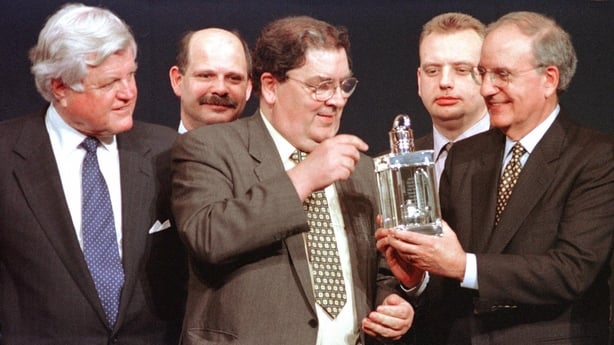By David McCullagh and Fiachra Ó Cionnaith
In the early 1990s, the Royal Ulster Constabulary noticed that loyalist paramilitaries were becoming more professional.
They had copied the IRA’s cell structure, they were trained not to crack under interrogation and they were getting much better at covering their tracks, destroying forensic evidence by burning getaway cars, washing clothing, and taking showers after operations.
However, these new practices led to the downfall of one terrorist, who followed orders by taking a shower after a shooting but then had to sign on at an RUC station as a condition of bail for another offence.
When he turned up at the station “still dripping wet from his shower”, suspicions were raised because “the person in question was not known for his regular bathing habits”. He was immediately arrested.
The increased professionalism of the deadly if fractious loyalist paramilitary groups was a serious concern in Dublin, according to newly released State papers.
There was a fear of cross-border attacks and of the random murder of innocent Catholics in the north.
There were also concerns in 1993 that SDLP leader John Hume was a target.
Along with their new operational effectiveness, the loyalists were also developing a more sophisticated political viewpoint, which observers believed was the work of an unidentified academic.
There were also claims that elements in the DUP and from the unionist middle-class were giving “a political and intellectual focus” to loyalist paramilitaries.
However, one loyalist contact advised Irish officials not to overstate this political sophistication, saying chillingly: “In the final analysis, recruits join the UVF to shoot people…”
The political representatives of loyalism, David Ervine and Billy Hutchinson of the Progressive Unionist Party (PUP), linked to the UVF, and Gary McMichael and Davy Adams of the Ulster Democratic Party (UDP), which represented the UDA, were well regarded in Dublin.
Read more:
British general described Saville Inquiry as ‘cynical’
Govt in 1992 argued over Israeli weapons purchase
Reynolds warned Yeltsin ‘might be worse for wear’
Five more things we learned from the State Papers
The same was true in Washington, with the White House describing them as “a breath of fresh air”, and easier to deal with than the Ulster Unionists.
However, senior figures in the UVF were reported to be so irritated by Ervine’s high profile that they tried to sideline him in 1995.
The following year, with the loyalist ceasefire under threat after the IRA ceasefire broke down, Ervine told an Irish government official about “the trouble we’ve been having trying to keep them [loyalist paramilitaries] away from the border”.
Ervine told Irish officials that he believed that “elements in British intelligence were attempting to undermine their position in the talks”.

If that was the case, other people in the British system took a different view.
In May 1997, senior official in the Northern Ireland Office John Steele admitted to his Irish counterparts that the loyalist ceasefire had in effect broken down, but that it would be counterproductive to exclude their political representatives from the talks process.
“Their presence at the talks was, at least, a restraining influence, serving to prevent the wilder elements from indulging in even more sectarian violence,” he said.
This remark was made at a time when Sinn Féin was excluded from the talks because the IRA was not on ceasefire.
The loyalist parties went on to play a role in negotiating the Good Friday Agreement, but the UDP failed to make a political impact, while the PUP’s electoral success was limited.
In 2004, Martin McGuinness worried that Ervine would leave politics out of frustration, describing him as “one of the good guys”.
Later that year, when former UDP figure Davy Adams was the subject of intimidation from his ex-comrades in the Lisburn UDA, he contacted Irish diplomats based in Belfast looking for help.
His concerns were passed on to the British by the Department of Foreign Affairs, an odd sequence of events for a loyalist.
[Based on documents in 2024/28/6, 2024/28/7, 2024/28/10, 2024/71/105, 2024/71/106, 2024/71/377, and 2024/71/392]
